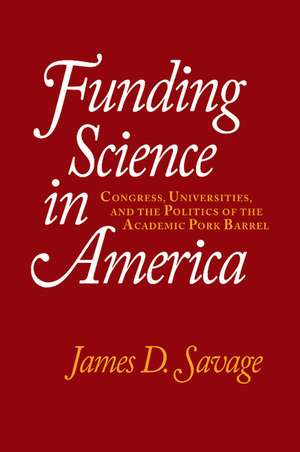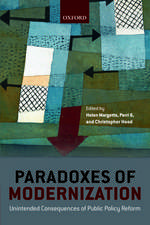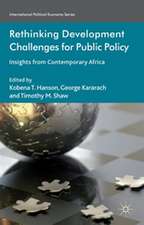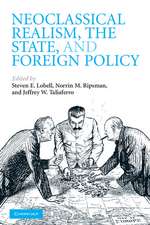Funding Science in America: Congress, Universities, and the Politics of the Academic Pork Barrel
Autor James D. Savageen Limba Engleză Paperback – 5 noi 2000
| Toate formatele și edițiile | Preț | Express |
|---|---|---|
| Paperback (1) | 234.27 lei 6-8 săpt. | |
| Cambridge University Press – 5 noi 2000 | 234.27 lei 6-8 săpt. | |
| Hardback (1) | 424.40 lei 6-8 săpt. | |
| Cambridge University Press – 12 apr 1999 | 424.40 lei 6-8 săpt. |
Preț: 234.27 lei
Nou
Puncte Express: 351
Preț estimativ în valută:
44.83€ • 46.90$ • 37.24£
44.83€ • 46.90$ • 37.24£
Carte tipărită la comandă
Livrare economică 02-16 aprilie
Preluare comenzi: 021 569.72.76
Specificații
ISBN-13: 9780521794619
ISBN-10: 0521794617
Pagini: 234
Ilustrații: 2 b/w illus. 13 tables
Dimensiuni: 154 x 229 x 17 mm
Greutate: 0.35 kg
Ediția:Revised
Editura: Cambridge University Press
Colecția Cambridge University Press
Locul publicării:New York, United States
ISBN-10: 0521794617
Pagini: 234
Ilustrații: 2 b/w illus. 13 tables
Dimensiuni: 154 x 229 x 17 mm
Greutate: 0.35 kg
Ediția:Revised
Editura: Cambridge University Press
Colecția Cambridge University Press
Locul publicării:New York, United States
Cuprins
Preface; 1. The politics of academic earmarking; 2. The incentives to earmark; 3. AAU and the fight against earmarking; 4. The struggle to fund academic research facilities; 5. Lobbyists, lobbying, and the pursuit of academic earmarks; 6. Congress and the distribution of academic earmarks; 7. Congress, and the president, and the fight against earmarking; 8. The future of academic earmarking; Notes; Selected bibliography.
Recenzii
"...covers the debate objectively and well, including the value-laden terms of equity versus quality and the alleged biases on each side (the traditional 'have-nots' and the elitist `haves'). The author complements his prose nicely with valuable tables and references, and he has turned a potentially boring issue into an informative, well-written intrigue about how Washington works that deserves to be read, studied, and quoted. Recommended for public, academic, and professional collections." Choice
"James D. Savage, a political scientist and a scholar of public policy at the University of Virginia in Charlottesville, tells the fascinating story of academic earmarking in his book. Funding Science in America is accessible and highly readable because Savage tells much of the story by way of the key actors in the drama. And so I can say without qualification that Savage has put the story together brilliantly. He has described the rise of pork barrel science funding accurately and comprehensively, and he is fair in his discussion of the various players, their motives and their incentives." The Sciences
"Savage is now and associate professor at the University of Virginia, and his well-traveled resume includes work on earmarking and other issues with several congressional support agencies: the Congressional Research Service, the former Office of Technology Assessment, and the General Accounting Office. That worldly, inside-the beltway experience combined with an equally impressive resume as a scholar results in a book that is fair, thorough, and well-researched." Norman Metzger, Issues in Science and Technology
"...this book is not a polemic. It presents a clear and balanced explanation of why earmarking occurs and what motivates the university presidents, congressional appropriators, and private lobbyists who make it happen. This book deserves to reach a wide audience of scientist and science policy analysts, elected officials and their staff, lobbyists, and the general public...a lively story, even humorous in parts, about a hot and continuing power struggle involving some of America's most imporant politicians and university presidents." George L. Leventhal, BioScience
"This book will undoubtedly be the definitive work of this era on the subject of earmarking...this is a fine book for anyone interested in the field, and one which students of American politics or the politics of the scientific enterprise can read with interest and profit." John S. Jackson, Public Budgeting & Finance
"...this book makes a valuable contribution to the literature on distributive politics in Congress. No doubt, students and scholars of congressional politics will enjoy the many narrative descriptions detailing the fate of various earmarks and the coalitions constructed to support and oppose them, particularly Savage's memorable account of Sen. Robert C. Byrd's battle with lobbyists over earmarkds Por West Virginia University. In addition, anyone concerned with the controversies and substantive policy issues in funding scientific research in the U.S. will find this book indispensible." Congress & The Presidency
"James Savage, now a professor of political science at the University of Virginia, was himself involved in the fray for a time as a staff member in the Office of the President of the University of California. He has written what is surely the definitive book on the subject. In doing so, he has performed a valuable service to the cause of understanding Congress, universities, and the way science policy is made - and not made - in America. As President of the Association of American Universities from 1983 until 1993, I was deeply involved in this issue, and I can confirm that Savage has pretty much got it right." Journal of Politics
"[This book] presents a clear and balanced expanation of why earmarking occurs and what motivates the university presidents, congressional appropriators, and private lobbyists who make it happen." BioScience
"James D. Savage has written an important and interesting book on the political struggle to determine the mechanism used to allocate federal funding supporting research in American colleges and universities.... A readable and thorough treatment of an important science policy question, this book offers an excellent case study of the collective problem in policy making." Southeastern Political Review
"Tho book is well grounded in social science theory, but it is alson rich with detail and alive with the realities of Washington politics...a must read for anyone who wants to understand government-university relations in the contemporary political environment." uTech & Culture Jul. 01
"James D. Savage, a political scientist and a scholar of public policy at the University of Virginia in Charlottesville, tells the fascinating story of academic earmarking in his book. Funding Science in America is accessible and highly readable because Savage tells much of the story by way of the key actors in the drama. And so I can say without qualification that Savage has put the story together brilliantly. He has described the rise of pork barrel science funding accurately and comprehensively, and he is fair in his discussion of the various players, their motives and their incentives." The Sciences
"Savage is now and associate professor at the University of Virginia, and his well-traveled resume includes work on earmarking and other issues with several congressional support agencies: the Congressional Research Service, the former Office of Technology Assessment, and the General Accounting Office. That worldly, inside-the beltway experience combined with an equally impressive resume as a scholar results in a book that is fair, thorough, and well-researched." Norman Metzger, Issues in Science and Technology
"...this book is not a polemic. It presents a clear and balanced explanation of why earmarking occurs and what motivates the university presidents, congressional appropriators, and private lobbyists who make it happen. This book deserves to reach a wide audience of scientist and science policy analysts, elected officials and their staff, lobbyists, and the general public...a lively story, even humorous in parts, about a hot and continuing power struggle involving some of America's most imporant politicians and university presidents." George L. Leventhal, BioScience
"This book will undoubtedly be the definitive work of this era on the subject of earmarking...this is a fine book for anyone interested in the field, and one which students of American politics or the politics of the scientific enterprise can read with interest and profit." John S. Jackson, Public Budgeting & Finance
"...this book makes a valuable contribution to the literature on distributive politics in Congress. No doubt, students and scholars of congressional politics will enjoy the many narrative descriptions detailing the fate of various earmarks and the coalitions constructed to support and oppose them, particularly Savage's memorable account of Sen. Robert C. Byrd's battle with lobbyists over earmarkds Por West Virginia University. In addition, anyone concerned with the controversies and substantive policy issues in funding scientific research in the U.S. will find this book indispensible." Congress & The Presidency
"James Savage, now a professor of political science at the University of Virginia, was himself involved in the fray for a time as a staff member in the Office of the President of the University of California. He has written what is surely the definitive book on the subject. In doing so, he has performed a valuable service to the cause of understanding Congress, universities, and the way science policy is made - and not made - in America. As President of the Association of American Universities from 1983 until 1993, I was deeply involved in this issue, and I can confirm that Savage has pretty much got it right." Journal of Politics
"[This book] presents a clear and balanced expanation of why earmarking occurs and what motivates the university presidents, congressional appropriators, and private lobbyists who make it happen." BioScience
"James D. Savage has written an important and interesting book on the political struggle to determine the mechanism used to allocate federal funding supporting research in American colleges and universities.... A readable and thorough treatment of an important science policy question, this book offers an excellent case study of the collective problem in policy making." Southeastern Political Review
"Tho book is well grounded in social science theory, but it is alson rich with detail and alive with the realities of Washington politics...a must read for anyone who wants to understand government-university relations in the contemporary political environment." uTech & Culture Jul. 01
Descriere
Funding Science in America, first published in 1999, explores the pros and cons of the academic earmarking issue.















